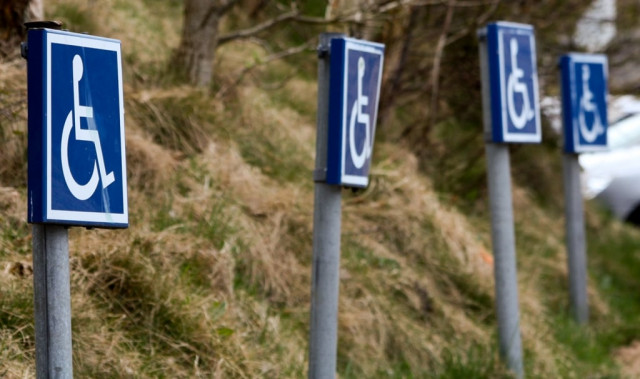US Senate revives UN disability treaty, fate uncertain
To date it has been ratified by 137 countries, including China, Pakistan, and most of Europe.

File photo of handicap parking. PHOTO: FILE
The Convention on the Rights of Persons with Disabilities (CRPD), adopted in 2006 by the United Nations, was signed by President Barack Obama in 2009. To date it has been ratified by 137 countries, including China, Pakistan, and most of Europe.
The convention sets fundamental rights for the disabled, including education and health care rights equal to those enjoyed by able-bodied people.
It also invokes freedom from employment discrimination and access to transport and public buildings, committing signatory nations to uphold such principles.
The CRPD fell six votes short in the 100-member Senate, where a two-thirds majority is required for passage of international treaties.
Some Republicans said it was a case of bad timing; the treaty's introduction violated a principle of not debating major measures just before inauguration of a new Congress in January.
Even though it was modeled on the Americans with Disabilities Act (ADA) - the landmark legislation which enshrined disability rights in the country and helped improve conditions around the world - critics said the treaty would infringe on US sovereignty.
Senator Orrin Hatch went so far as to warn on the Senate floor in July that ratifying CRPD "would endorse an official ongoing role for the United Nations in evaluating virtually every aspect of American life."
But supporters said they sense renewed momentum, and one of the treaty's main Republican proponents, Senator John McCain, said some in his party who opposed it last year "are giving it consideration."
"We're talking to a lot of people about it," McCain told AFP Wednesday. "We are working the issue."
The committee on Tuesday held the first of two hearings on the measure, with its Democratic chairman Senator Robert Menendez saying he hopes for a vote by year's end.
"It won't be easy, but if we can get the Senate to listen to the facts instead of the fear-mongering, I'm confident we can get there," Menendez told the hearing.
"We're making an all-out effort to try to achieve success this time."
He said ratification was a matter of maintaining US leadership on the issue.
But social conservatives warn it would merely invite interference in domestic affairs, even though proponents say the basic treaty includes no enforcement mechanism or penalties.
If the treaty has no impact on US law, and the ADA already has the most sweeping protections in the world, "Then why do it?" Michael Farris, chairman of the Home School Legal Defense Association, told AFP before addressing Tuesday's hearing.
"It's creating a universal standard that all nations including the US have to comply with."
Christian conservative activists launched a campaign last year against the convention's Article 7 which states that in action concerning children with disabilities, "the best interests of the child shall be a primary consideration."
Farris interprets that as yielding power to Washington to compel a disabled child to attend school, even if his parents want him taught at home.
Right-to-life conservatives have also warned that the convention would open the door toward expanded abortion rights, something experts said was unlikely.
Richard Thornburgh, a Republican former attorney general, dismissed as "alarmist" the claims that the convention could trump US law on American soil.
"This is not a country that's going to submit to any worldwide body," he said.
Elizabeth MacNairn, executive director of Handicap International USA, said ratification would give Washington a crucial "place at the table" for establishing rights worldwide.
"It adds heft to the kind of work we're doing with our partners in Nepal, to say that we too have ratified this instrument, we too work on making services accessible, we too are part of this international dialogue," MacNairn said.
Congresswoman Tammy Duckworth, a military veteran who lost both legs in Iraq, said she had "egg on my face" because she could not tell disability-rights advocates in Asia that the United States is leading on the issue.
"We have what should be the gold standard in disability access, yet our legitimacy to lead other nations is weakened, because we have not yet ratified the CRPD," she testified.
"We should be at the head of the table, and we're not."



















COMMENTS
Comments are moderated and generally will be posted if they are on-topic and not abusive.
For more information, please see our Comments FAQ